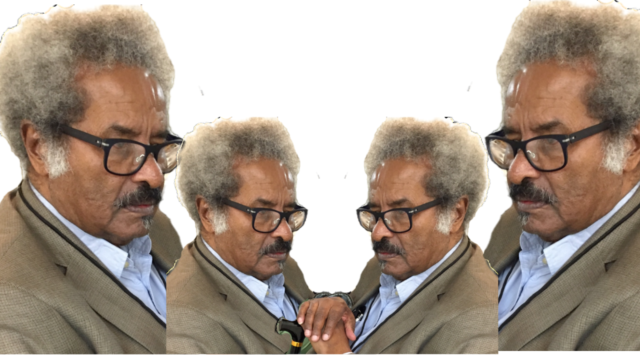Amnesty International pays tribute to Ethiopia’s human rights giant, Professor Mesfin Woldemariam, who died aged 91 on 29 September, having distinguished himself as one of the country’s most prominent human rights defenders.
Renowned for saying “Oppression needs people who can bear it”, Professor Woldemariam was one of the founders in 1991 of the Ethiopian Human Rights Council (EHRCO), the country’s first civil society organisation exclusively dedicated to the cause of human rights at a time when repression was rife following years of military rule.
Renowned for saying “Oppression needs people who can bear it”, Professor Woldemariam was one of the founders of the Ethiopian Human Rights Council.
Professor Woldemariam’s activism started while he worked as a lecturer in geography at Addis Ababa University in the years following the failed 1960 coup attempt against Emperor Haile Selassie. In a move that was widely seen as an attempt to silence dissent at the university, Professor Woldemariam was one of the university’s staff handed administrative government jobs in the 1970s. He was appointed Governor of Gimbi Sub-Province in Wellega, Oromia, but he refused to take up the appointment unless it was personally offered by Emperor Haile Selassie. He eventually got his day with the Emperor.
Professor Woldemariam, however, found himself on the wrong side of public sentiment when the military government decided to execute some 60 former senior government officials implicated for their role in the 1973-75 famine by a government commission of inquiry that Prof. Woldemariam was part of. The commission’s findings were never revealed nor were the suspects given the opportunity to defend themselves in fair trials.
He found his footing again, returning to the limelight by partnering with others to form the Ethiopian Human Rights Council a few months after dictator Mengistu Hailemariam was overthrown in 1991. Professor Woldemariam often explained that the Council was created to educate and assist the then transitional government in “respecting, protecting and fulfilling human rights”.
He went on to lead the organization as its chair until 2005 and endured ceaseless harassment and intimidation from the government for investigating, documenting and reporting human rights violations.
On leaving the EHRCO, he joined politics as an adviser to the Rainbow Party, which was part of the opposition Coalition for Unity and Democracy (CUD), that took on the ruling Ethiopia People’s Revolutionary Democratic Front (EPRDF) in the highly contested 2005 general election.
This election was marred by post-election violence that erupted in Addis Ababa and other major cities in June and November 2005, leading to the arrest of Professor Woldemariam and 29 other opposition leaders and journalists. He was charged and prosecuted in a trial that fell well below international fairness standards and sentenced to life imprisonment on 16 July 2007.
During his imprisonment, Amnesty International declared him a Prisoner of Conscience detained solely for peacefully exercising his human rights, and campaigned for his immediate and unconditional release.
During his imprisonment, Amnesty International declared him a Prisoner of Conscience who was detained solely for peacefully exercising his human rights, and campaigned for his immediate and unconditional release.
In July 2011, Professor Woldemariam was released alongside 38 other opposition politicians, prominent human rights defenders and journalists who were unjustly detained after they signed a request for pardon.
After his release, Professor Woldemariam wrote many books and published articles for local newspapers. Amnesty International salutes Professor Woldemariam for his contribution to human rights in Ethiopia.
May he rest in power!

























